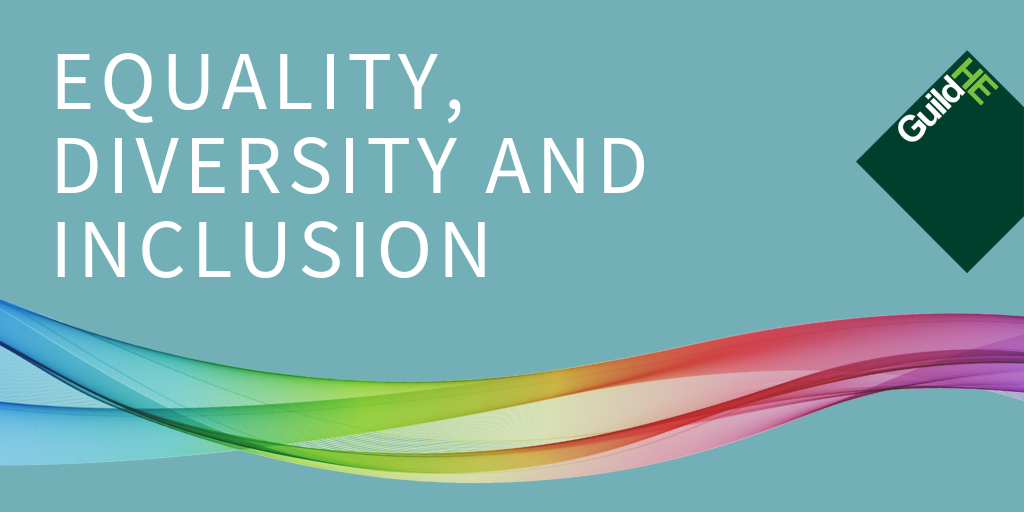By Professor Nick Braisby, Chair of GuildHE EDI network and Vice Chancellor of Buckinghamshire New University
Working within the EDI space has always generated reward and challenge in equal measure. On the one hand, there is the prospect of contributing to real and lasting change and the broadening of inclusion that enriches both society and our higher education communities. On the other, it can take great bravery to challenge ingrained behaviours and ways of thinking and doing so often provokes negative and hostile reactions. Our political climate does not always help either: witness the Prime Minister’s recent ill-directed concern about (presumably non-transgender) people being bullied into supporting transgender issues, when the evidence of course suggests that bullying almost exclusively occurs in the opposite direction.
The fact that vitally important EDI work can come with such challenge is all the more reason why those working within the EDI space need support, and one of the reasons why, as GuildHE EDI Board Champion, I was delighted to support GuildHE’s recent inaugural EDI Symposium.
The day gave an excellent overview of the varied work taking place within our institutions. First off, we were treated to an excellent and engaging keynote speech from Fiona Hathorn, CEO of WB Directors which previously operated as Women on Boards UK. Covering a broad sweep of the issues involved in making boards and executive teams more diverse she touched on the importance of setting targets, not relying on unconscious bias training (“it doesn’t work”), the power of reverse mentoring, and the intriguing prospect of merging leadership teams with EDI teams.
We also heard from Julie Walkling, Director of Academic Partnerships at the JS Group, our generous meeting sponsor. We heard about the power of the JS Group to place financial hardship funds into students’ bank accounts, often within minutes, and of the analytics that the group provides, helping institutions to determine with some precision what funding is most effective in supporting their students.
Our second keynote was delivered by David Bass, Director of EDI at Advance HE. GuildHE members may have heard from David before as he leads Advance HE’s proposals to reform their existing EDI accreditation and kitemark schemes. David spoke about the need not just to streamline the existing schemes, but to develop an holistic approach involving proportionate judgments. GuildHE members, reflecting on the financial and human cost of the existing schemes and the disproportionate impact this has on smaller institutions, looked forward to hearing more as the proposals develop.
As well as these talks, we were treated to six different case studies, each showcasing innovation and impact at GuildHE institutions. Gareth Smith, Executive Director of Student Life and Strategy and his colleague Karim West spoke about UA92’s scheme to alleviate digital poverty and UA92 Youth – projects reaching out to 14-18 year olds in the local community.
Dr Alex Blower, Access and Participation Manager, Arts University Bournemouth, spoke about the University’s “Being a Boy” project, an initiative which provides space for young men to creatively engage with the role of masculinity in their day-to-day lives.
Zahara Chowdhury, HR Business Partner for EDI at Buckinghamshire New University, spoke about how the institution created its new EDI strategy and how it is being implemented.
Sharon Watson, CEO and Principal of the Northern School of Contemporary Dance, treated us to a personal reflection on what it means to lead an organisation through the challenge of addressing EDI in a meaningful way.
Finally, rounding off the day, first Patrick Johnson, Pro Vice-Chancellor Diversity, Inclusion; Students from The University of Law, spoke about EDI with professions in mind, and then Phaedra Petsilas, Head of Studies at the Rambert School of Ballet and Contemporary Dance outlined recent work in EDI supported by knowledge exchange funding.
Overall, the day was both fascinating and inspiring, covering engagement, research, strategy and pedagogy, and it perfectly illustrated the different ways in which EDI is being pursued in a diverse range of institutions. It also showed the importance of lived experience, and the need for EDI work to be informed by authentic voices. Above all, I was deeply impressed to see so many people working so hard to rise to the various challenges of EDI and create better environments for our higher education communities. If only our political leaders saw what we saw at this symposium then I think they would be more encouraging of the excellent work being undertaken across the sector.

